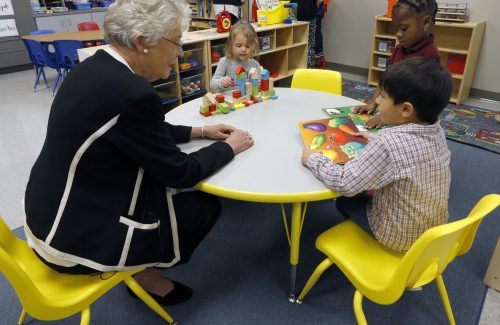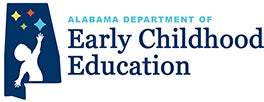Governor Ivey Announces 34 New Classrooms Funded by Pre-K through 3rd Grade Integrated Approach to Early Learning

MONTGOMERY – Governor Kay Ivey and the Alabama Department of Early Childhood Education on Tuesday announced that 34 new classrooms will be funded through the Pre-K through 3rd Grade Integrated Approach to Early Learning (P-3). This will bring the number of classrooms impacted by P-3 to 208 covering 21 counties.
“Today’s announcement is part of an intentional effort to give Alabama’s children a strong start towards a successful educational career,” Governor Ivey said. “P-3 works to align the gains in First Class Pre-K to ensure students do not have a gap in instruction. I am proud that we can provide more tools for teachers and school leaders to continue providing students with the best models for learning in the critical early years.”
The recipient schools are as follows:
- Harmony School, in Cullman County
- Blount Elementary, in Montgomery County
- Iola Roberts Elementary, in Pell City
- Edgewood Elementary, in Selma
- Myrtlewood Elementary, in Tuscaloosa County
- Carbon Hill Elementary, Curry Elementary, Parrish Elementary, and Lupton Junior High in Walker County
- Lynn Elementary School, in Winston County
The goal of the P-3 program, now moving into its fifth year, is to expand the early learning continuum from First Class Pre-K through 3rd grade. The Alabama Department of Early Childhood Education and the Alabama State Department of Education are working together to align instructional practices, assessment and leadership from pre-K to 3rd grade.
P-3 works to ensure student success and achievement gap closure by expanding access to the nationally recognized, high-quality First Class Pre-K program model and taking the most successful parts of K-3 initiatives to establish a strong foundation of early learning experiences that promote student achievement and success.
“As we work to align the birth through 8-year-old early learning continuum, P-3 provides successful transition of Pre-K children and families into their school settings,” Alabama Department of Early Childhood Education Secretary Barbara Cooper said. “Data shows that First Class Pre-K students are more likely to be proficient in reading and math and less likely to have disciplinary issues or be retained in a grade.”
P-3 is funded by the Alabama Department of Early Childhood Education through the Governor’s Strong Start, Strong Finish education initiative, and the federal Preschool Development Grant, Birth through Five.
Currently, 3,022 children are impacted by the P-3 program. With the addition of 34 new classrooms to the program, more than 3,600 students will be participating in the Pre-K – 3rd Grade Integrated Approach to Early Learning in the upcoming 2021-2022 school year.
In addition to the P-3 classroom funding, administrators are given the opportunity to participate in the National Association of Elementary School Principals (NAESP) Pre-K – 3rd Grade Leadership Academy. To date, 79 Alabama elementary school principals and school system administrators have successfully completed the academy with another 24 to finish by April. The first collaborative initiative of its kind in the nation, the P-3 Leadership Academy is provided in partnership with NAESP and the Council for Leaders in Alabama Schools (CLAS). This is the only such program in which participants, upon successful completion of the program, receive a national certification credential.
Leadership is critical in successful education initiatives. By applying their knowledge of child development, subject matter content, assessment, and pedagogical approaches to align educational experiences along the P-3 continuum, educators ensure that children enter classrooms that promote their ongoing educational progress by building on what they learned during the previous year. Knowing this, educators can intentionally integrate the developmental domains into the teaching and learning subject matter for young children.
Research findings from multi-year early education interventions suggest that the components of the P-3 approach can combine to make a positive contribution to young children’s learning, providing the pathways through which more children will achieve success by the end of 3rd grade.
